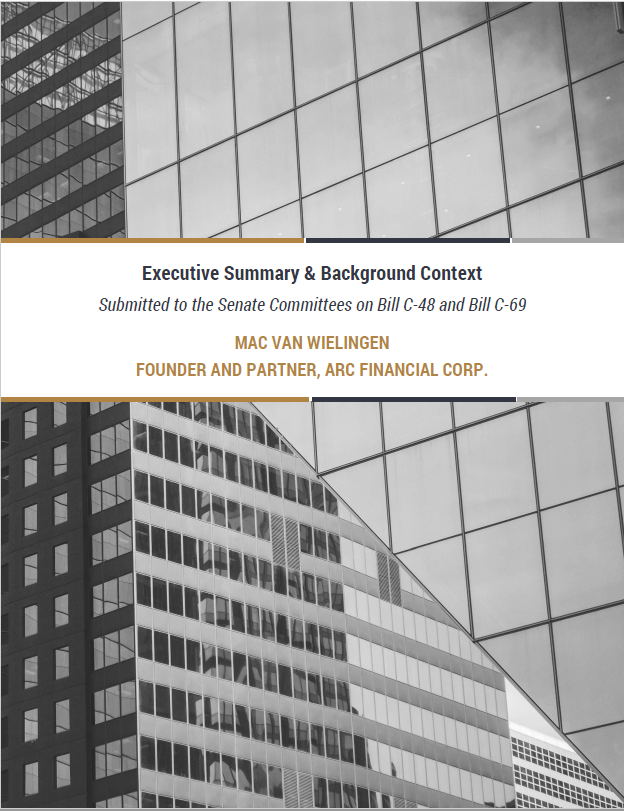perspectives on the consequences of Bill c-69 and Bill c-48
Canada’s energy sector is world-class in scale – in its resource base, technical, and managerial capabilities – and it is the largest sub-sector of the Canadian economy, but it is being progressively hampered, if not dismantled, by “made-in-Canada” political, legal, and regulatory processes. It has undeniably lost its competitive footing. Investment confidence and interest within public and private markets, as well as within the corporate sector, have collapsed. There is no fundamental justification for the damage we have done to ourselves. The common explanations come wrapped in concern and criticism about our energy sector’s environmental, social, and governance (ESG) standards.
This belies a critical truth. Our ESG standards and performance are as good as it gets in the world.
Yes…our oil sands have created controversy. The primary criticism has been the relatively high greenhouse gas emissions (GHGs), but they represent an insignificant 0.15% of global emissions[1,2]. If phased out and replaced with supplies from other countries, the estimated reduction in global GHG emissions would be a negligible 0.03% (3/100 of 1%)[3]. For additional context, the estimated one-year increase in GHG emissions from China and India in 2018 (over 2017) is equivalent to adding nearly ten Canadian oil sands/year [4].
The unity of the country has been put at risk and the upside for doing so is a truly negligible reduction in GHG emissions.
Canada’s oil sand’s GHGs are immaterial to the issue of global GHG emissions and climate change. Further, emission levels for new oil sands projects are in line with the average of crude oil refined within the United States (U.S.). This should be a game changer for energy policy in Canada. We also have a world-class pipeline and marine transportation system with the highest safety standards in the world. The Canadian oil and gas sector has been a model of shared prosperity for all Canadians. Alberta’s cumulative net contribution to the Federal government from 1961 to 2017 is in excess of $600 billion[5]. Alberta has always been a ‘giver’ within confederation and never a ‘taker’ [6].
Upstream oil and gas activity in Canada has created over 528,000 direct and indirect jobs [7]. The oil and gas sector is also the largest employer of Indigenous People in Canada [8,9] creating a meaningful alignment of interest and the opportunity for partnering arrangements.
Our world-class energy sector, with world-class ESG standards and performance, as a major financial contributor to all of Canada, and as a major employer, is being taken down and dismantled on the basis of perceptions that have been unduly influenced by U.S. funders of activist agencies within Canada.
The damage has been the result of our own “made-in-Canada” actions, but our actions rest on a foundation of perceptions that have been largely “made-in-the-U.S.A.” These perceptions, which have now been absorbed within a large part of the public, are steeped in symbolism versus empiricism, and more often than not are based on exaggerations versus a balanced sense of proportion and context.
Bill C-48 and Bill C-69, as currently drafted, are further examples of “made-in-Canada” damage, and the underlying perceptions reflect a “rigidity of perspective” that is not in our national interest.
As a Canadian with decades of experience in the investment management business focused on the energy sector, and having been involved in capital raising and investment projects all over the world, my recommendation to the Senate Committees reviewing Bill C-48 and Bill C-69 are this:
Withdraw Bill C-48 in its entirety. It is a message of extremism; it is cynical; it is divisive; it is not based on science and empiricism; and it is not in Canada’s national interest.
Introduce substantive amendments to fix Bill C-69. Adopt the major amendments proposed by active project proponents and, in particular, those amendments that will reduce the risk of political versus regulatory and expertise-based decision making.
These recommendations are not a push back on strong environmental protection. They are a push back on unjustifiable extremism in the case of Bill C-48, and excessive politicization of project decision-making and “bad governance” implicit within Bill C-69.
Mac Van wielingen
Canada’s OPPORTUNITY in energy leadership DOCUMENT
PRESS COVERAGE
Media Inquiries
sources
1 Environment and Climate Change Canada 2018; World Resources Institute.
2 Natural Resources Canada, “GHG emissions: A shared challenge.”
3 Data: IHS Markit, “The greenhouse gas intensity of oil sands production.” Analysis: ARC Financial Research; Viewpoint Research Partners.
4 Global Carbon Project, Carbon budget and trends 2018.
5 Mintz, “Two different conflicts in federal systems…”
6 Morton, Presentation to the Economic Education Association of Alberta on February 8-9, 2019.
7 CAPP, The economic contribution of Canadian oil and natural gas.
8 Excluding 2016 and 2017, where British Columbia employed on average, 1,850 more people.
9 Statistics Canada.






